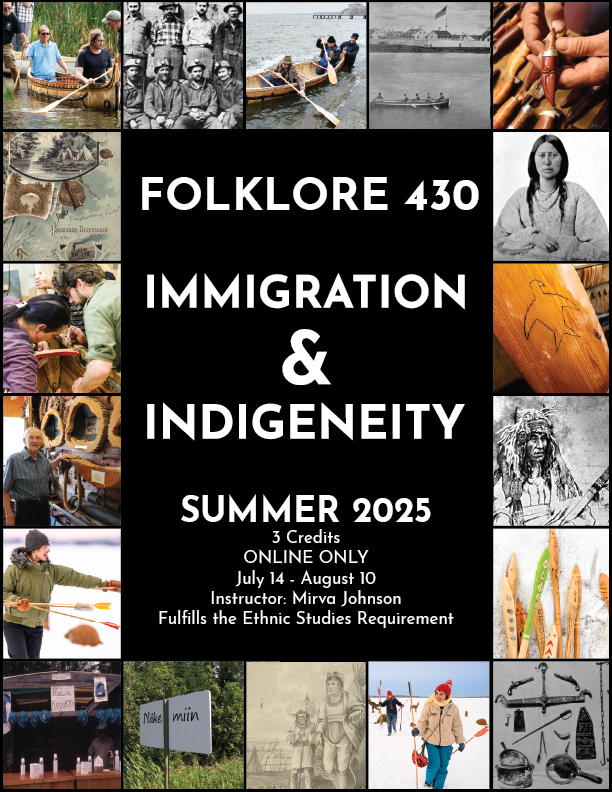Featured Course

This is an accordion element with a series of buttons that open and close related content panels.
FOLKLORE 100 - Introduction to Folklore
(3 credits)
- Online (This is a modular section that meets June 16, 2025 thru July 27, 2025 (Session Code DFF, 6 weeks of instruction)
- In person: MTWR 9:00 – 11:00 am (This course is only open to “Summer Collegiate Experience” students and meets on the days/times indicated.) (This is a modular section that meets June 23, 2025 thru August 3, 2025 (Session Code EFF, 6 weeks of instruction))
Course Description: This course serves as an introduction to folklore; that is, the arts, beliefs, stories, sayings, customs, and ways of communication we engage with in our everyday lives. We’ll be examining a variety of folklore genres, while also learning about and employing the methods and practices of folklore scholars. Because this is a practical as well as theoretical course, we will be conducting fieldwork in the region as part of a semester-long folklore project. By the end of the term, you will be able to better understand what folklore is, how and why it functions, and the many and often hidden ways that it is a part of our everyday lives. You’ll learn about ethnographic methods and techniques and how to use interviews, photography, and videography to document various genres of folklore. You’ll better understand what culture is, how it affects our everyday lives, and how it is transmitted, changed, created and re-created, lost, found, and reclaimed.
Prerequisites: None
Summer FOLKLORE 100 is not a Comm B course.
FOLKLORE 210- The African Storyteller
(3 credits)
- Section 1: Online (This is a modular section that meets June 16, 2025 thru July 27, 2025 (Session Code DDD, 4 weeks of instruction)
Instructor – Oluwadamilola Ogunmuko
- Section 3: Online (This is a modular section that meets May 19, 2025 thru June 15, 2025 (Session Code ZDD, 4 weeks of instruction)
Instructor – Nneoma Onwuegbuchi
Course Description: Description to come!
FOLKLORE 327 - Vampires
(3 credits)
- Online (This is a modular section that meets July 14, 2025 thru August 10, 2025 (Session Code HDD, 4 weeks of instruction)
Course Description: Explores the development of the vampire legend in folklore, rumor, literature, cinema, television, and popular culture and in relation to topics such as colonization, race, gender, sexuality, and class.
Prerequisites: Sophomore standing
FOLKLORE 430 - Immigration and Indigeneity in the Upper Midwest
(3-4 credits)
- Online (This is a modular section that meets July 14, 2025 thru August 10, 2025 (Session Code HDD, 4 weeks of instruction)
Instructor: Mirva Johnson
Course Description: The story of the Upper Midwest is one of indigeneity and immigration. Long inhabited by Indigenous communities, the region has been subjected to continuous colonization since the 1600s. Europeans and Yankees alike moved to the region and today make up a large percentage of what we often stereotype as the Midwest. But the communities of the Upper Midwest are diverse and ever changing. The Upper Midwest is made up of rural and urban, old migrant communities and new, indigenous and immigrant, and a host of other identities that are constantly in contact, changing and adapting. We’ll be examining the lived experiences and folklore of some of these communities, by looking at first-person accounts, reading articles about the region, watching films about the many unique traditions in the area, and discussing our own expertise and experiences about immigration and indigeneity. By learning more about the complicated intersections of immigration and indigeneity, we can better understand the history and vernacular expressions of the people who call the Upper Midwest home.
This is a practical as well as theoretical course, so class projects will incorporate ways in which you can (and will) make your research available to the public. There will also be required fieldwork in and around the Upper Midwest.
Prerequisites: None